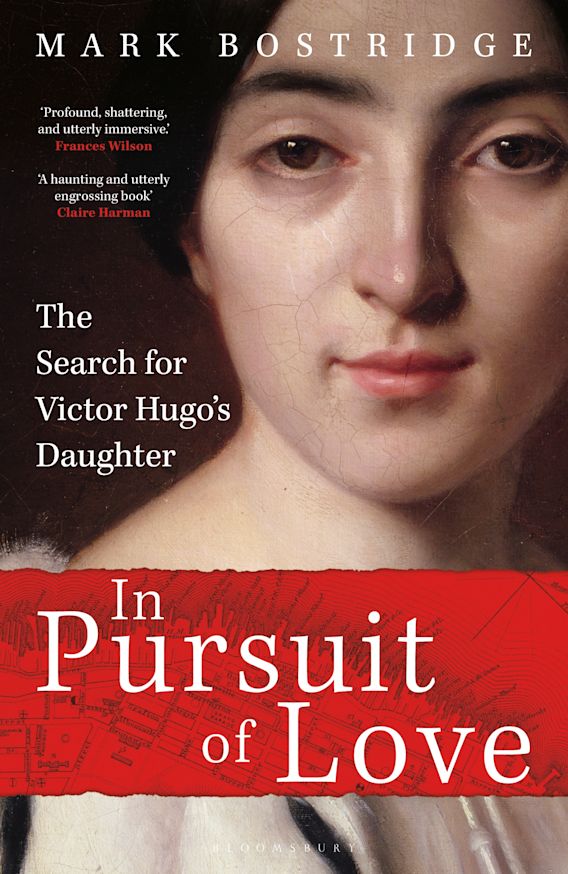Mark Bostridge, author of 'In Pursuit of Love. The Search for Victor Hugo’s Daughter', looks at the challenges biography writers face, and the new approaches that are reinventing the format.

How do you approach the writing of biography at the end of the first quarter of the twenty-first century? A simple enough question, with a straightforward answer, one would have thought. After all, no country has a stronger or prouder tradition of biographical writing. The names of famous past biographers trip off the tongue: Aubrey, Johnson, Boswell, Mrs Gaskell, Strachey.
Furthermore, the attraction of biography to the reader seems easy to pinpoint. It appeals to our innate curiosity about human personality. As Coleridge understood it, more than two centuries ago, ‘An inquisitiveness into the minutest and casual sayings of eminent contemporaries is quite natural’. Biography also satisfies our interest in factual knowledge, in feeding our somewhat naïve belief that we can find out ‘exactly what happened’.
So why then is biography currently failing? It’s less visible on publishers’ lists and in reviews in newspapers. Larger booksellers have symbolically demoted it, moving their biography sections upstairs to shadowy areas of their shops, working on the assumption that a standard ‘life’ of someone, however well known, will not pull in the impulse buyer from the high street.
The readership for conventional historical and literary biography is beginning to die out. Younger generations will not replace these older readers. Where they read for pleasure – itself an area of marked decline among the under 25’s – young readers are far more likely to choose fiction above biography, which is widely perceived as an essentially conservative genre and one, moreover, where the books tend to be heavyweight both in length and price.
The knock-on effect of this fall from grace has been inevitable. Poor sales have led to low advances. As a result biographers have had to stint on their research. A book that would once have taken a minimum of five years now has to be completed in two, to keep the howling wolf of penury and starvation from the writer’s door.
But all is not gloom and doom. Just over a century ago biography entered upon a new age. The spirit of this revival was defined by a desire to treat life-writing more experimentally, as an art-form in its own right. The overly discreet, commemorative, doorstopper Lives and Letters of the Victorians were dismissed as outdated. ‘The New Biography’ emphasised choice and synthesis in the use of documentary material, as well as a sense of form that valued the distillation of an individual’s personality above any notion of the ‘truth of fact’.
There are signs of renewal again now. There may still be too many biographies of familiar subjects – the umpteenth life of Hardy, for instance, using time-worn material. But writers are searching out new approaches to questions about how an individual’s life can be represented, demonstrating in the process how the biographer, like the novelist, need not be inhibited by the demands of accuracy, but can seek a new kind of freedom through the development of different kinds of literary structures and forms.
Some of the most successful of these experiments centre on the biographical subject’s relationship to place and landscape, widening the context through which a life may be understood. Another example, Frances Wilson’s recent biography of D.H. Lawrence, Burning Man, discards the notion that a biography must necessarily be a cradle-to-grave affair, offering instead a triptych of tales that reveal Lawrence through his lesser known works, following him on a trail from Cornwall to Italy to New Mexico.
I myself have been on a trail. My new book, In Pursuit of Love. The Search for Victor Hugo’s Daughter focuses on the elusive figure of the great writer’s younger daughter Adèle. Adèle Hugo’s unrequited love for an English soldier led her to stalk him, first to Nova Scotia, where she pretended to be his wife, and then to Barbados from where she was eventually brought back to Paris, spending the second half of her long life in mental institutions, rich from the inheritance of her father’s copyrights.
I set out on a journey, shadowing Adèle in all the places in which her sad, fraught life story had played out. I managed properly to identify the soldier for the first time, tracking down his descendants, and have been able to solve some of the mystery surrounding him and his motives for becoming involved with Adèle.
But in writing the book I was also attempted something else. I wanted to know why Adèle’s story had obsessed me for so many years, right back to my student days when I saw the film that François Truffaut based on her life. I wanted to ask the question, in what ways do the historical lives we explore reflect on our own unexamined existences?
Throughout In Pursuit of Love, fragments of my own story interact with Adèle Hugo’s experiences. What I hope is that this biographical experiment of mine shows the power of a biographer’s empathy for his subject, as he offers an embrace of understanding across a divide of 160 years.
In Pursuit of Love. The Search for Victor Hugo's Daughter is available from Bloomsbury.com
Mark Bostridge's books include Vera Brittain: A Life, shortlisted for the Whitbread Biography Prize, the NCR Award for Non-Fiction and the Fawcett Prize, the bestselling Letters from a Lost Generation, Florence Nightingale. The Woman and Her Legend, awarded the Elizabeth Longford Prize for Historical Biography, and The Fateful Year, England 1914, shortlisted for the PEN Hessell-Tiltman Prize. He has written widely for national newspapers and journals, and appeared on television and radio
Comments